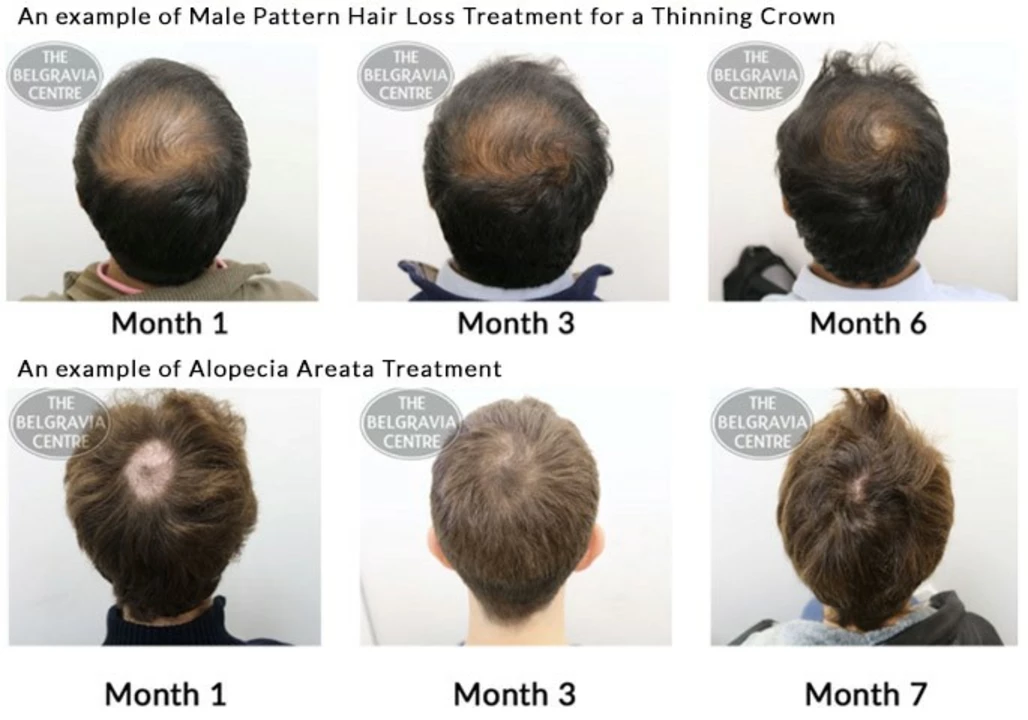Hair Loss Prevention: Tips for Combating Androgenic Alopecia

Understanding Androgenic Alopecia: The Root Cause of Hair Loss
Before we dive into the tips for combating androgenic alopecia, it's essential to understand what it is and why it happens. Androgenic alopecia, also known as male or female pattern baldness, is a genetic condition that affects both men and women. It is characterized by the gradual thinning and loss of hair, primarily on the top and front of the scalp. This hair loss is due to the sensitivity of hair follicles to a hormone called dihydrotestosterone (DHT), which causes the follicles to shrink and produce thinner, weaker hairs until they eventually stop producing hair altogether.
By understanding the root cause of androgenic alopecia, we can better approach the prevention and treatment of this condition. In this article, we will discuss six essential tips for combating hair loss caused by androgenic alopecia. So, let's get started!
Maintaining a Healthy Diet for Strong and Nourished Hair
A well-balanced diet plays a significant role in maintaining healthy hair and preventing hair loss. Including essential vitamins, minerals, and nutrients in your diet can help to strengthen hair follicles and promote hair growth. Focus on incorporating foods rich in protein, iron, zinc, vitamin D, and omega-3 fatty acids into your daily meals. These nutrients are known to support hair growth and overall hair health.
Some examples of hair-healthy foods include lean meats, fish, eggs, nuts, seeds, leafy greens, and whole grains. In addition, make sure to stay hydrated by drinking enough water throughout the day, as dehydration can negatively impact hair health.
Proper Hair Care: Be Gentle with Your Hair
Practicing proper hair care can go a long way in preventing hair loss due to androgenic alopecia. It's crucial to be gentle with your hair, especially when it's wet, as it is more susceptible to breakage. Avoid using harsh shampoos or chemical treatments that can strip your hair of its natural oils and weaken the hair shaft. Instead, opt for gentle, sulfate-free shampoos and conditioners that are specifically formulated for thinning hair.
Additionally, minimize the use of heat styling tools, such as hair dryers, curling irons, and straighteners, as excessive heat can damage the hair and cause breakage. When brushing your hair, use a wide-toothed comb or a brush with soft bristles to prevent unnecessary pulling and tugging on the hair.
Scalp Care: Keep It Clean and Nourished
A healthy scalp is the foundation for healthy hair growth. To prevent hair loss caused by androgenic alopecia, it's essential to maintain a clean and nourished scalp. Regularly washing your hair with a gentle shampoo can help to remove dirt, oil, and product buildup that may be clogging hair follicles and hindering hair growth.
In addition to keeping your scalp clean, consider incorporating scalp massages into your hair care routine. Massaging the scalp can help to stimulate blood circulation, which in turn provides essential nutrients to the hair follicles and promotes hair growth. You can also use natural oils, such as coconut, olive, or jojoba oil, to moisturize and nourish the scalp.
Stress Management: Give Your Hair a Break
Stress can exacerbate hair loss caused by androgenic alopecia. When our bodies are under stress, they produce higher levels of cortisol, a hormone that can negatively impact hair growth. Therefore, managing stress is crucial in preventing hair loss and promoting overall well-being.
There are many ways to manage stress, including practicing mindfulness, engaging in regular exercise, getting enough sleep, and maintaining a healthy diet. Find the stress-reduction techniques that work best for you and make them a part of your daily routine.
Consider Hair Loss Treatments: FDA-Approved Options
If you're already experiencing hair loss due to androgenic alopecia, it might be time to consider FDA-approved treatments that can help slow down or reverse the hair loss process. Two of the most common treatments for androgenic alopecia are minoxidil (Rogaine) and finasteride (Propecia).
Minoxidil is a topical solution that is applied directly to the scalp to stimulate hair growth. It is available over-the-counter and is suitable for both men and women. Finasteride, on the other hand, is a prescription medication taken orally and is only recommended for men. Both treatments have been proven to be effective in slowing down hair loss and promoting new hair growth, but it's essential to consult with your healthcare provider before starting any new treatments.
Seek Professional Advice: Consult a Trichologist or Dermatologist
If you're concerned about hair loss due to androgenic alopecia, it's always a good idea to seek professional advice. A trichologist or dermatologist can help to diagnose the cause of your hair loss and recommend appropriate treatments or lifestyle changes to prevent further hair loss.
Remember, early intervention is key when it comes to combating androgenic alopecia. By following these tips and seeking professional advice, you can take control of your hair loss and work towards maintaining a healthy, full head of hair.

Leslie Ezelle
May 7, 2023 AT 09:13Dilip p
May 7, 2023 AT 21:44Kathleen Root-Bunten
May 9, 2023 AT 19:45Vivian Chan
May 10, 2023 AT 18:05andrew garcia
May 11, 2023 AT 15:21ANTHONY MOORE
May 11, 2023 AT 19:51Jason Kondrath
May 12, 2023 AT 13:32Jose Lamont
May 14, 2023 AT 08:57Ruth Gopen
May 15, 2023 AT 18:02Nick Bercel
May 16, 2023 AT 12:37Alex Hughes
May 17, 2023 AT 11:32Hubert vélo
May 17, 2023 AT 13:39Kalidas Saha
May 19, 2023 AT 00:06Marcus Strömberg
May 19, 2023 AT 22:32Matt R.
May 20, 2023 AT 21:54Wilona Funston
May 21, 2023 AT 23:02